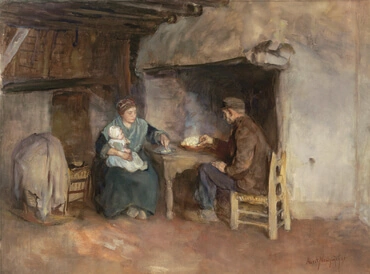2342. 'And he baked unleavened bread' means purification. This is clear from the meaning of 'unleavened' or without yeast. In the Word 'bread' means in general every celestial and spiritual food, and so in general everything celestial and spiritual, see 276, 680, 1798, 2165, 2177. The need for the latter to be free of all impurities or unholiness was represented by 'unleavened bread'; for 'yeast' means the evil and falsity by means of which celestial and spiritual things are rendered impure and profane. On account of this representation those who belonged to the representative Church were forbidden in sacrifices to offer any bread or minchah other than bread without yeast, that is, unleavened, as is clear in Moses,
Every minchah which you bring to Jehovah shall be made without yeast. Leviticus 2:11. In the same author,
You shall not sacrifice the blood of My sacrifice with that made with yeast. Exodus 23:18; 34:25.
[2] They were also forbidden therefore to eat any other bread during the seven days of the Passover than bread without yeast, that is, which was unleavened. This prohibition occurs in the following verses in Moses,
For seven days you shall eat unleavened bread; even on the first day you shall remove yeast from your houses, for anyone eating that made with yeast, that soul shall be cut off from Israel, from the first day until the seventh. In the first [month], on the fourteenth day of the month, in the evening, you shall eat unleavened bread until the twenty-first day of the month, in the evening. For seven days no yeast shall be found in your houses, for anyone eating that made with yeast, that soul shall be cut off from the congregation of Israel, whether a settler or one born in the land. Exodus 12:15, 19-20.
The same prohibition appears in other places as well, such as Exodus 13:6-7; 23:15; 34:18; Deuteronomy 16:3-4. Consequently the Passover is called the Feast of Unleavened Bread, Leviticus 23:6; Numbers 28:16-17; Matthew 26:17; Luke 22:1, 7.
[3] That the Passover represented the glorification of the Lord and so the conjunction of the Divine with the human race will in the Lord's Divine mercy be shown elsewhere. And because the conjunction of the Lord with the human race is effected by means of love and charity, and by means of the faith deriving from these, celestial and spiritual things were represented by the unleavened bread which they were to eat each day during the Passover. Consequently to prevent the defilement of those things by anything unholy they were strictly forbidden to eat anything made with yeast, so strictly that any who did so were to be cut off; for those who profane celestial and spiritual things inevitably perish. Anyone may see that but for this arcanum within it that observance, together with so harsh a penalty, would never have been introduced.
[4] Everything that was commanded in that Church represented some arcanum, even the actual cooking, as with every instruction which the children of Israel carried out when they were leaving Egypt, namely that they were to eat that night flesh roasted by fire, and unleavened bread on bitter herbs; they were not to eat it raw or cooked in water; the head had to be on its legs; they were to let none of it remain until the morning; they were to burn what was left over with fire, Exodus 12:8-10. Every detail of these instructions was representative - eating it at night; flesh roasted by fire; unleavened bread on bitter herbs; the head on the legs; not raw; not cooked in water; not leaving any until the morning; and burning what was left with fire. But the arcana represented are in no way apparent unless they are disclosed by means of the internal sense. That sense alone shows that all these details are Divine.
[5] Something similar was done in the ritual for the taking of a Nazirite vow. The priest was to take the cooked shoulder of the ram, and one unleavened cake from the basket, and one unleavened wafer, and he was to place them on the palms of the Nazirite after he had shaved his consecrated head, Numbers 6:19. Anyone who does not know that a Nazirite represented the celestial man himself does not know either that every detail of these instructions embodies celestial things, and so arcana, which are not apparent in the letter, namely the instructions to take the cooked shoulder of a ram, an unleavened cake, an unleavened wafer, and to shave off his hair. This also shows what kind of opinion regarding the Word can be gained by people who do not believe in the existence of an internal sense, for without the internal sense such details are of no consequence at all. But when the ceremonial or ritualistic element has been stripped away everything becomes Divine and holy. Everything else has a deeper meaning, as does 'unleavened bread' which means the holiness of love, or what is most holy, as it is also called in Moses,
The unleavened bread that was left over was to be eaten by Aaron and his sons in a holy place, for it was most holy. Leviticus 6:16-17.
'Unleavened bread' therefore means pure love, and 'the baking of that which is unleavened' purification.







